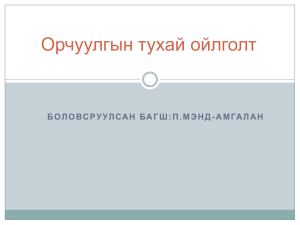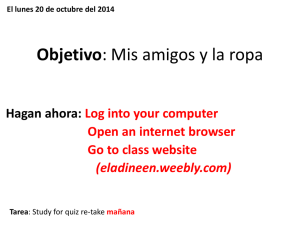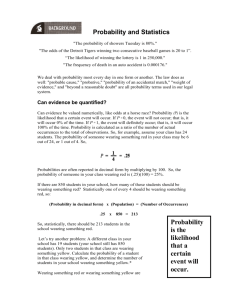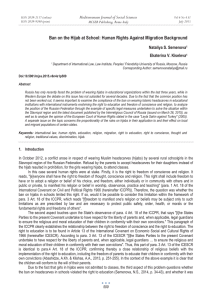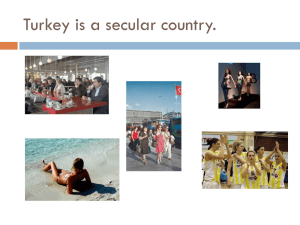Word
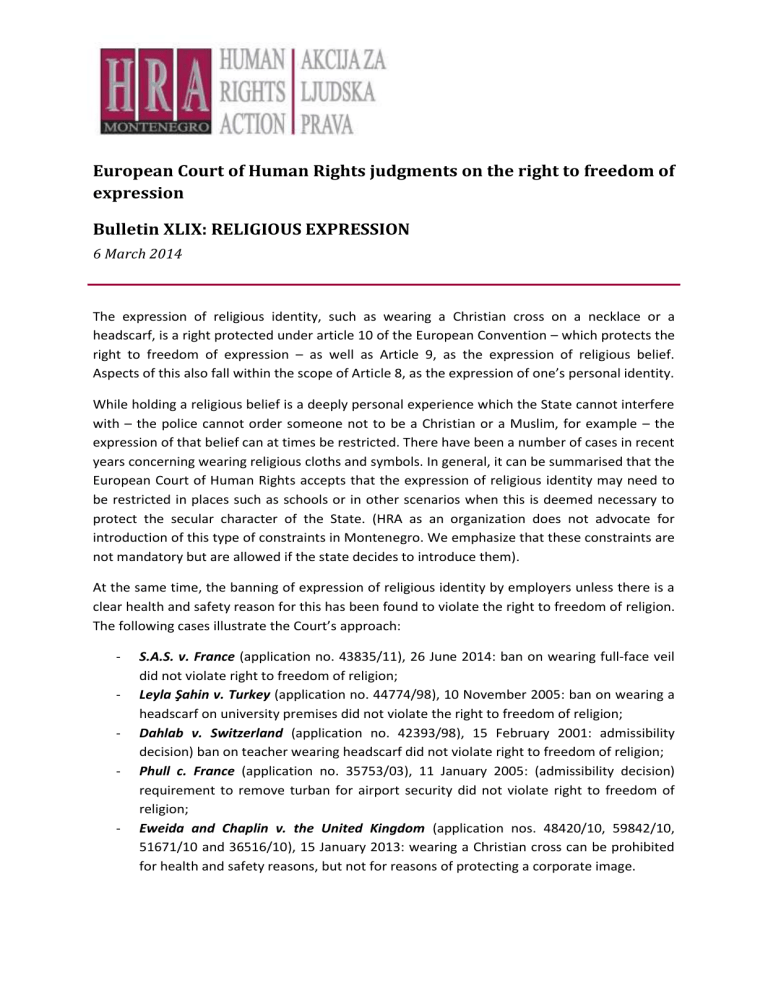
European Court of Human Rights judgments on the right to freedom of expression
Bulletin XLIX: RELIGIOUS EXPRESSION
6 March 2014
The expression of religious identity, such as wearing a Christian cross on a necklace or a headscarf, is a right protected under article 10 of the European Convention – which protects the right to freedom of expression – as well as Article 9, as the expression of religious belief.
Aspects of this also fall within the scope of Article 8, as the expression of one’s personal identity.
While holding a religious belief is a deeply personal experience which the State cannot interfere with – the police cannot order someone not to be a Christian or a Muslim, for example – the expression of that belief can at times be restricted. There have been a number of cases in recent years concerning wearing religious cloths and symbols. In general, it can be summarised that the
European Court of Human Rights accepts that the expression of religious identity may need to be restricted in places such as schools or in other scenarios when this is deemed necessary to protect the secular character of the State. (HRA as an organization does not advocate for introduction of this type of constraints in Montenegro. We emphasize that these constraints are not mandatory but are allowed if the state decides to introduce them).
At the same time, the banning of expression of religious identity by employers unless there is a clear health and safety reason for this has been found to violate the right to freedom of religion.
The following cases illustrate the Court’s approach:
S.A.S. v. France (application no. 43835/11), 26 June 2014: ban on wearing full-face veil did not violate right to freedom of religion;
Leyla Şahin v. Turkey (application no. 44774/98), 10 November 2005: ban on wearing a headscarf on university premises did not violate the right to freedom of religion;
Dahlab v. Switzerland (application no. 42393/98), 15 February 2001: admissibility decision) ban on teacher wearing headscarf did not violate right to freedom of religion;
Phull c. France (application no. 35753/03), 11 January 2005: (admissibility decision) requirement to remove turban for airport security did not violate right to freedom of religion;
Eweida and Chaplin v. the United Kingdom (application nos. 48420/10, 59842/10,
51671/10 and 36516/10), 15 January 2013: wearing a Christian cross can be prohibited for health and safety reasons, but not for reasons of protecting a corporate image.
S.A.S. v. France (application no. 43835/11), 26 June 2014: ban on wearing full-face veil did not violate right to freedom of religion
This concerned a French Muslim who complained that following the entry into force in 2011 of a law prohibiting the concealment of one’s face in public places she was no longer able to wear the full-face veil in public. She argued that this violated her right to express her religious identity; she wore the burqa and niqab in accordance with her religious faith, culture and personal convictions. She also emphasised that this was her personal choice: she was not pressured by her husband or anyone else. Her aim in this was not to cause a nuisance to others, but to live her life in accordance with her religious convictions.
The Grand Chamber of the Court held that the ban on her wearing a full face veil did not violate
Article 8, protecting the right to respect for privacy, nor Article 9, protecting the right to freedom of religion. The Court noted that the law had been introduced to provide equal conditions for the enjoyment of all religions as part of France’s “living together” policy, which protected fundamental ideals of democracy, liberty and equality. The Court considered that this was a legitimate aim and emphasised that individual states have a considerable “margin of appreciation” in deciding how measures such as this can be implemented. The Court held that there was no violation of the right not to be discriminated against in the enjoyment of one’s religion either. While the Court admitted that the ban had specific negative effects on the situation of Muslim women who, for religious reasons, wished to wear the full-face veil in public, this was justified by the wider aim of devising a society where all religions can “live together”.
Leyla Şahin v. Turkey (application no. 44774/98), 10 November 2005: ban on wearing a headscarf on university premises did not violate the right to freedom of religion
This concerned a Turkish student who had been banned from wearing an Islamic headscarf at university. She was a practising Muslim and eventually felt forced to leave the country and pursue her studies in Austria, where wearing a headscarf was permitted. She complained to the
European Court on Human Rights that the ban in Turkey violated her right to freedom of religion.
The Court held that there had been no violation of the right to freedom of religion. It noted that the matter had been considered by the Turkish Constitutional Court, which had ruled that wearing a headscarf in universities violated constitutional values of constitutionalism and equality. The Court noted that these values were central to Turkish democracy and were central to protecting the rights to liberty and equality. This protected individuals not only from State interference in the enjoyment of religion, but also from external pressure from extremist movements. The Court noted the impact that wearing a headscarf could have on others not wearing it, particularly when wearing one was presented as or perceived as a compulsory religious duty. It was therefore legitimate for the State to ban wearing a headscarf on university premises.
Dahlab v. Switzerland (application no. 42393/98), 15 February 2001: admissibility decision) ban on teacher wearing headscarf did not violate right to freedom of religion
This concerned a primary-school teacher who had converted to Islam. She had worn a headscarf in school for several years but, after several years, was banned from wearing it by school authorities. She complained that this violated her right to express her religious belief.
The European Court of Human Rights declared that the ban did not violate her right to express her religious belief and declared her application “manifestly ill-founded”. It considered as important that the applicant taught children between the ages of four and eight years old, and that the wearing of a headscarf by a teacher might have a strong impact on such young children.
The Court held that “it cannot be denied outright that the wearing of a headscarf might have some kind of proselytising effect, seeing that it appears to be imposed on women by a precept which is laid down in the Koran and which, as the [Swiss] Federal Court noted, is hard to square with the principle of gender equality.” The Court concluded therefore that, “[i]t therefore appears difficult to reconcile the wearing of an Islamic headscarf with the message of tolerance, respect for others and, above all, equality and non-discrimination that all teachers in a democratic society must convey to their pupils.” The right of a teacher to express her religious belief was therefore outweighed by the broader interest in society in preserving religious harmony.
Phull c. France (application no. 35753/03), 11 January 2005: (admissibility decision) requirement to remove turban for airport security did not violate right to freedom of religion
This concerned a member of the Sikh religion who complained that airport authorities had interfered with his right to freedom of religion by requiring him to remove his turban as part of a security check imposed on passengers entering the departure lounge. He argued that there had been no need for the security staff to make him remove his turban, especially as he had not refused to go through the walk-through scanner or to be checked with a hand-held detector.
The European Court of Human Rights held that this application was “manifestly ill-founded” and there was no violation of the right to freedom of expression. It considered that security checks in airports were necessary in the interests of public safety and that the question of how to ensure airport safety was well within the State’s margin of appreciation.
Eweida and Chaplin v. the United Kingdom (application nos. 48420/10, 59842/10,
51671/10 and 36516/10), 15 January 2013: wearing a Christian cross can be prohibited for health and safety reasons, but not for reasons of protecting a corporate image
This concerned two applicants who were practising Christians and who had been banned from displaying their necklaces with a Christian cross. One worked for British Airways; the second was a nurse. They complained that the restriction on visibly wearing Christian crosses around their necks while at work violated their right to freedom of religion, and that domestic law had failed adequately to protect their rights.
The Court held that in relation to the British Airways employee, there had been a violation of the right to freedom of expression but that there had not been a violation in the case of the nurse. The Court held that the lack of protection in UK law to regulate the wearing of religious symbols did not as such present a violation of the right to freedom of expression. UK law contained a broad prohibition against discrimination, and claims could be brought within the context of that. With regard to the British Airways employee, the Court held that the countervailing rights and interests were the applicant’s right to express her religious beliefs on the one hand, and the employer’s desire to project a certain corporate image on the other. In this balancing exercise, the employer’s interests had been given undue prominence in the domestic courts. As regards the nurse, the Court emphasised that she had been asked to remove her cross for health and safety reasons. This was a more important interest than her own right to express her religious identity.
Prepared by Peter Noorlander, Director of Media Legal Defence Initiative, London in cooperation with HRA
Bulletins are published within the project “Support for Understanding Journalistic Ethics and Freedom of Expression” funded by the U.S. Embassy Podgorica .
